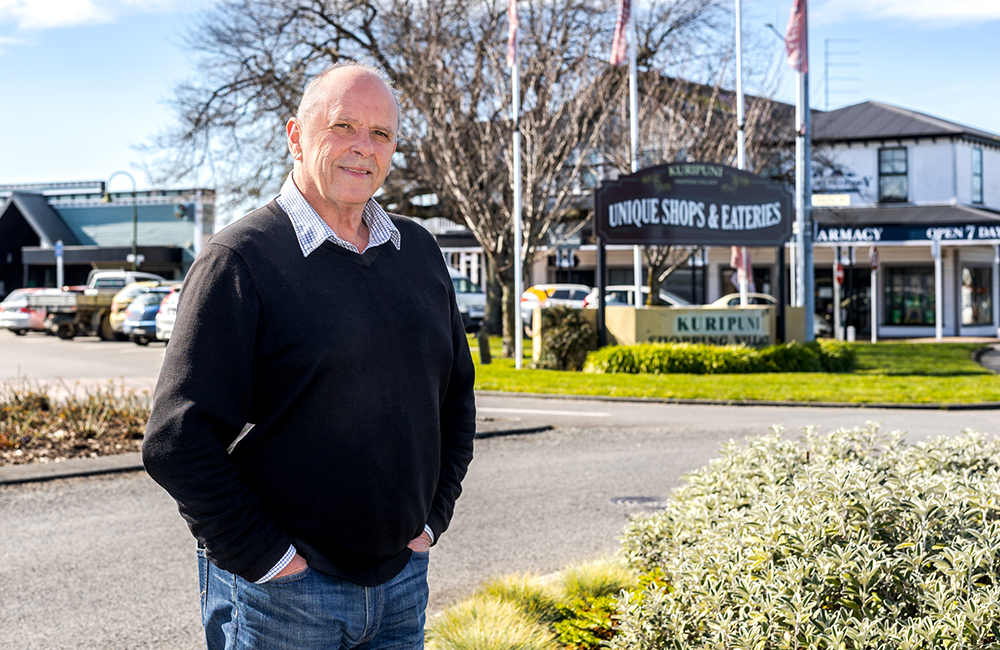Redevelopment of local landmarks and community facilities
Community and relationships are at the heart of WBS, and a tribute to our enduring success since we started 150 years ago. Our relationship with local building contractor and developer David Borman is a testament to this, one that has seen the revitalisation of much of Masterton’s business district, and the redevelopment of local landmarks and community facilities.
Pictured above, David Borman.
Wairarapa Building Society (WBS) was formed in 1980 by the amalgamation of three different building societies, the eldest of which was formed 150 years ago in 1873. These older building societies and their successor WBS all shared a common goal – to help build domestic and commercial properties in Wairarapa.
Community and relationships are foundational for WBS, and are attributed to the company’s enduring success.
This is exemplified by the evolving relationship local building contractor and developer David Borman has had with WBS for many years. It is a relationship that has seen the revitalisation of much of Masterton’s business district, and the redevelopment of local landmarks and community facilities.
With the support of WBS, David is now undertaking the restoration of one of Masterton’s oldest commercial buildings, one that has filled several roles in Masterton’s history.
Raised in Masterton, David started work as a carpenter in 1975, serving an apprenticeship with Timmins Construction, largely working on rural properties. Before his apprenticeship had finished, the company was dissolved and David was transferred to Masterton-based builder M.B. Brown Limited. Owner Merv Brown was a long-term director of WBS.
After cutting his teeth as a foreman at M.B. Brown for ten years, David founded his own building company, D.R. Borman Ltd.
The region was growing rapidly and there were twice as many builders within a decade. With an expanding workforce, David was able to undertake more complicated building projects, winning numerous awards for his work on houses throughout Wairarapa.
Many of the people shifting to the Wairarapa from outside the region were looking for architect-designed properties, and D.R. Borman quickly gained a reputation for the quality of their work.
The company also worked on many development projects, including the extensive works required to transform an old Hutt Valley railway workshop into the majestic ‘White Swan’ hotel in Greytown.
While his expanding company was concentrating on domestic work and work for other developers, David had an eye for property development, an interest that was encouraged by the WBS management team.
“Wairarapa Building Society was instrumental in getting that first loan to purchase my first site. It was newish territory for me but they gave me their full support and were really helpful along the way,” says David.
Over the years, David has changed the face of much of central Masterton, with the support of WBS.
One of the first major projects was the much-needed redevelopment of the Kuripuni shopping area. David had a vision of a sophisticated shopping destination with boutique businesses and a range of eateries. Over several years, new buildings were erected and a range of clothing and other businesses attracted to the area.
In 2015, Wairarapa locals were treated to a special screening at the opening of a combined café and cinema. The new theatre meant Masterton had two movie houses again, after a lapse of decades following the closure of the State Theatre.
Many of Masterton’s beautiful old buildings have been given a new lease of life by David. One of its most striking buildings, the Art Deco Wairarapa Times-Age building in Chapel Street, was in urgent need of repurposing after the newspaper contracted out its printing. The building was reorganised, with the Times-Age using one part while the rest was let to commercial tenants.
The Chilton Building, on the corner of King and Chapel Streets, was strengthened, redeveloped and modernised, and now houses a variety of tenants including the popular Don Luciano cafe.
As well as developing commercial properties, David is active in providing more housing, with developments off Casel Street and on the old Totara School site. A recent collaboration with Emerge Aotearoa provides social housing in Iorns Street.
David Borman’s project management skills have also been put to use for the community. He worked to help develop the Town Square in Chapel Street and led the redevelopment of the netball courts in Colombo Road.
His current project – and one close to his heart – is the restoration of the Theatre Royal (Empire Store). Built in 1879, the building has served as a general store, theatre, town hall, grocer, New World supermarket, and a retail space.
The pressed tin ceilings, lost from sight during one of its many redevelopments, are visible once again, and original decorative tiles at the entrance have been revealed. The mezzanine flooring is being painstakingly restored and replacement balustrades are being created using the original (now unusable) balustrades as a template.
“It’s exciting and important – to me, and I hope to the wider community. This is an old Masterton building with a long history, and I hope to do it justice. The support of WBS has really been above and beyond, and I’m so grateful for their support over the years,” says David.
History of a grand old theatre
Shortly after the Masterton Permanent Building and Investment Society was started in 1876, a new building was erected on Queen Street opposite the Empire Hotel, and was accordingly named the Empire Store. Owned by the Blyth Brothers, it was opened in 1879, but it wasn’t a commercial success, and the brothers were looking for new owners when fate intervened in March 1882.
The Masterton Institute building in Lincoln Road, which served as the Town Hall as well as housing the town’s library, was burned to the ground. There was no municipal funding for a replacement. A group of local businessmen bought the Empire Store and converted it into a theatre – the Theatre Royal – which then served as the town’s de facto Town Hall.
It was not perfect for the purpose –the exterior walls and the roof were all corrugated iron, and performers and audiences alike complained about the terrible acoustics.
The Masterton Trust Lands Trust built a new hall in Lincoln Road, and in 1896 the Theatre Royal was redeveloped – the iron-clad walls were replaced by brick and grocer John Graham shifted down from Bannister Street.
The Graham family ran their general store from the site until the 1960s when it was redeveloped as a New World supermarket. When the supermarket shifted to Bruce Street, it was altered to fit three retail businesses. Many locals will recognise the building in its most recent incarnation as the former Hunting and Fishing store.
Both WBS and the Borman family have played a significant role in shaping the commercial life of the Wairarapa, supporting local people to achieve their goals. Together they are working to restore the mana of this important building in Masterton.


